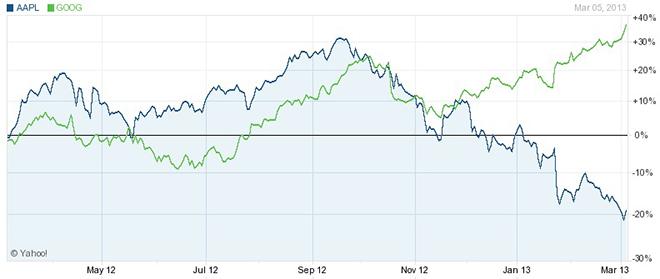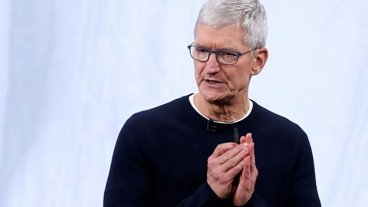Ad strength, Apple uncertainty drive Google's stock share surge
By most metrics, Apple is surging, with record sales and insatiable consumer demand, but it is Google that has become Wall Street's latest stock darling, even as shares of Apple have declined.
Source: Yahoo! Finance
Apple remains among the most valuable companies in the world, trading first and second place with Exxon Mobil as its share price fluctuates. Apple's market cap is still 46.4 percent larger than Google's, but the search giant's surging share price is gradually narrowing the gap. Google's stock has risen by 35 percent in the past 12 months, while Apple's has dropped 21 percent. As of 9:00 a.m. EST on Wednesday, Apple was trading at $431.14, while Google was near twice that at $838.60.
The reason, a Bloomberg article explains has to do with ads and optimism. Google holds more than 40 percent of the U.S. online ad market, with the potential to grab even more going forward.
"There's only one company, benefitting from all the growth areas of the Internet — be it video, mobile, local, social, display advertising," one analyst said. "Apple has just done well in devices, nothing else."
That analysis may sell short the strength of Apple's device sales model, which generated $12.9 billion in revenues for supporting software in 2012. It does, though, capture investor sentiments regarding the two companies.
In terms of operating systems, the two companies together account for more than nine out of ten smartphone shipments worldwide. The number of areas where the two companies directly compete is growing also. Google, which already owns smartphone and tablet manufacturer Motorola, recently announced a Chrome OS-powered notebook with a high-resolution screen that tops even Apple's Retina MacBook Pros.
With the premium smartphone market appearing to approach saturation, investors are concerned that Apple's model can only take it so far unless the company introduces another breakout product. Current rumors center on a possible iWatch or the perennially-expected Apple TV.
Neither of these products is certain to arrive in the coming year, though, and competitors are drawing consumer interest in the smartphone segment by offering devices with larger screens and comparable build quality. Apple's main competitor — and Google's largest Android ally — Samsung is also preparing to launch its 2013 flagship smartphone, with the accompanying marketing campaign aimed at knocking Apple from its perch atop the smartphone market.
Google, meanwhile, will grab 55 percent of the U.S. mobile advertising market this year, according to EMarketer, growing that share to 57 percent in 2014. Its Android operating system is on more than two out of every three smartphones sold worldwide, ensuring that its mobile ad presence will continue to grow. Google also moved ahead of Facebook in display-based advertising in 2012, with 18 percent of the market. Add to that the resolution of multiple anti-trust investigations, and investors see a huge opportunity for continuing growth for the company.
Not all of the investor class is down on Apple, though. Berkshire Hathaway chief Warren Buffett said recently that he believes Apple should buy back its own stock using some of its $137 billion cash pile. Buffett likened the tactic to "buying dollar bills for 80 cents." Also, analysts at Goldman Sachs recently described AAPL as the most undervalued stock the firm covers, targeting its price at $660.
 Kevin Bostic
Kevin Bostic











 Chip Loder
Chip Loder
 Andrew Orr
Andrew Orr
 Marko Zivkovic
Marko Zivkovic
 David Schloss
David Schloss

 Malcolm Owen
Malcolm Owen

 William Gallagher
William Gallagher







